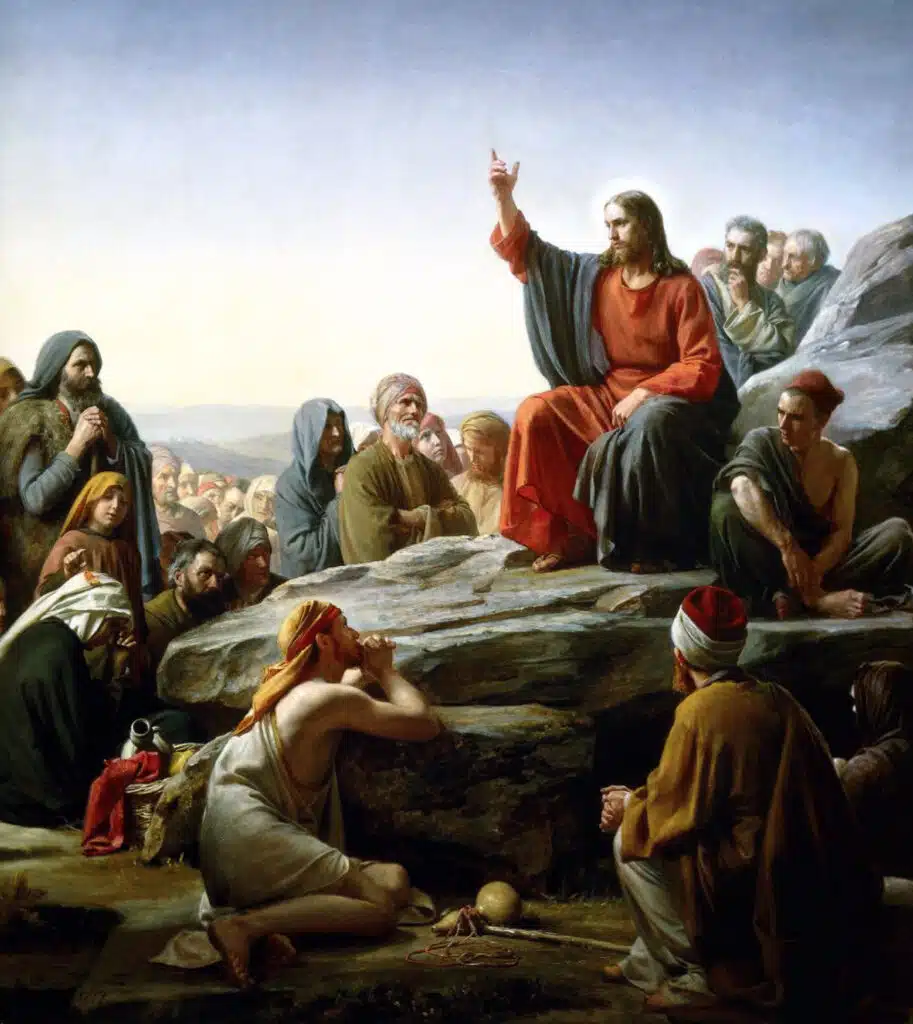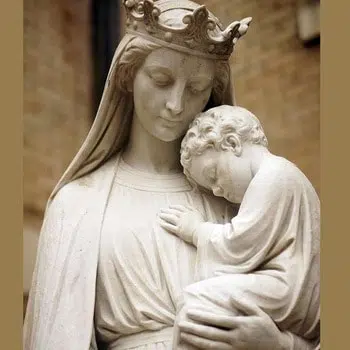Hope in the New Year

“If we have no peace, it is because we have forgotten that we belong to each other.” ― St. Teresa of Calcutta
The Jubilee Year began on Christmas Eve with Pope Francis opening the Holy Door of St. Peter’s Basilica. A jubilee year, which occurs every twenty-five years, serves both to remind and encourage all Catholics (indeed all peoples) to dedicate their attention to the renewal of their relationship with God and with their neighbor.
In his papal bull Spes non confudit, which announced the Jubilee Year, the Holy Father expressed his desire that the “Jubilee be a moment of genuine, personal encounter with the Lord Jesus, the ‘door’ (cf. Jn 10:7,9) of our salvation, whom the Church is charged to proclaim always, everywhere, and to all as ‘our hope’“ (1 Tim 1:1).” In the midst of wars, violence, political turmoil, injustice, and indifference to the incomparable value of human life, the Pope wants the Jubilee to be lived as a “year of hope,” a time to not only recommit to the love of God but also to the love of one’s neighbor, “to be tangible signs of hope for those of our brothers and sisters who experience hardships of any kind.”
With the opening of the Holy Door, the Jubilee of Hope 2025 has officially begun! pic.twitter.com/LQi4RQx3YC
— Vatican News (@VaticanNews) December 24, 2024
The Gospels are replete with examples of how the Lord expects His disciples to act, teaching us that our concrete choices reflect our love for God and how we live and treat others. Obedience to the Commandments and Jesus’ teaching, for example, are both a sign and test of our love for God: “If you love me, you will keep my commandments” (Jn 14:15). In the Parable of the Good Samaritan (Lk 10: 25-37), we learn that “love” is a word that requires action—seeing the plight or need of one’s neighbor and responding with care and compassion.

And instilled with holy fear (i.e., love for God), because we will be held accountable before God for our actions as taught in “The Judgment of the Nations” (Mt 25:31-46), we commit ourselves to living a holy life, to living righteously in the sight of God. Jesus tells us, after all, that we will be reminded of the situations in which we either saw Him in those around us and either helped or did nothing—“in” the vulnerable and weak, the preborn, elderly, sick or dying, or “among” the poor, hungry, naked, homeless, etc. And we will ask, “Lord, when did we see You hungry…?” And Jesus will say, “Amen, I say to you, what you did not do for one of these least ones, you did not do for me.”
Faith Brings Fruitful Works
“Faith without works is dead,” says St. James (Jas 2:26). In other words, professing faith without demonstrating it through works is considered incomplete. It is ineffective because it fails to bear witness to one’s faith in daily life through good deeds and righteous behavior. But a faith shaped by the Lord and His teaching both sanctifies one’s life and creates an attitude, a behavior that expresses itself.
And despite the darkness of our world, the Church, the People of God, rooted in faith, look beyond this darkness to the hope that is found through a life in Christ. This faith inspires us to not only cultivate an expectation of good things to come, but also to be a tangible witness of hope in the current moment, especially in our relationships with friends, family, and community.
Quoting St. Paul in the opening words of his papal bull, Pope Francis communicates his vision for the Holy Year: “Hope Does not Disappoint” (Rom 5:5). Having been justified by faith (Rom 1:18-3:20), we experience its first benefit, peace with God through Jesus Christ through whom by faith we stand and rejoice in hope of the glory of God.
🎥 HIGHLIGHTS | Cardinal Baldassare Reina, Pope Francis's Vicar General, opens the Holy Door of the Basilica of St. John Lateran. This is the third Holy Door of the Jubilee of Hope 2025. pic.twitter.com/om1qwr1cHq
— EWTN Vatican (@EWTNVatican) December 29, 2024
With Hope We Rest in Christ
The virtue of hope responds to this innermost desire and helps us to place our trust in God. As the Catechism of the Catholic Church describes,
The virtue of hope responds to the aspiration to happiness which God has placed in the heart of every man; it takes up the hopes that inspire men’s activities and purifies them so as to order them to the Kingdom of heaven; it keeps man from discouragement; it sustains him during times of abandonment; it opens up his heart in expectation of eternal beatitude. Buoyed up by hope, he is preserved from selfishness and led to the happiness that flows from charity (no. 1818).
Our heart’s deepest desire is to be with the Lord forever. Our hope rests in Christ Himself! And as the Catechism stresses, the assurance of this love and presence of God in Jesus Christ is our strength, confidence, and comfort. This unshakable trust in the promises of God, therefore, helps us to boldly proclaim with St. Paul “that neither death, nor life, nor angels, nor principalities, nor present things, nor future things, nor powers, nor height, nor depth, nor any other creature will be able to separate us from the love of God in Christ Jesus our Lord” (Rom 8:38-39).

Tertullian, an early Church Father, summarizes this approach to daily life best when saying that “Patience is hope with the lamp lit.” The lit lamp symbolizes the persistence of hope, which casts away both fear and darkness. Hope helps us navigate the turbulent waters of this world and challenges of the daily life, being “a lamp for [our] feet, a light for [our] path” (Ps 119:105).
“God is the foundation of hope, says Pope Benedict XVI, “not any god, but the God who has a human face and who has loved us to the end” (Spes salvi, no. 31). Through this love, we are empowered to live meaningfully: “To live for Him means allowing oneself to be drawn into His being for others”(Spes salvi, no. 29). In other words, we are to proclaim the joy of hope to a world in need.
Hope is Rooted in Charity
As we face challenges, suffering, and uncertainties, Pope Benedict reminds us that Jesus brought us “something totally different:
…an encounter with the Lord of all lords, an encounter with the living God and thus an encounter with a hope stronger than the sufferings of slavery, a hope which therefore transformed life and the world from within…even if external structures remain unchanged” (Spes salvi, no 4).
And in a world that idealizes self-sufficiency and pragmatism, placing its confidence in modern scientific, philosophical, and political thought, Pope Benedict warns that “man can never be redeemed simply from outside…. man is redeemed by love” (Spes salvi, nos. 24, 26). Adding that,
Man’s great, true hope that holds firm in spite of all disappointments can only be God—God who has loved us and who continues to love us ‘to the end,’ until all ‘is accomplished’ (Spes salvi, no. 27).
Regarding God’s unconditional love and our obligation toward our neighbor, Jesus provides a clear teaching in His response to the lawyer’s question, “Teacher, which commandment in the law is the greatest?” (Mat 22:36). Jesus replies,
You shall love the Lord, your God, with all your heart, with all your soul, and with all your mind. This is the greatest and the first commandment. The second is like it: You shall love your neighbor as yourself (Mat 22:37-39).
Jesus, instead of responding with a single commandment, gives two. “Love God” is the first and greatest commandment; there is no equivalent. After all, one cannot genuinely love their neighbor until they are grounded in a love for God with their whole being.
But such love never stands alone. “The second [commandment] is like it,” says Jesus. He means it is indispensable.
It is not like the disciples had never heard this teaching before (cf. Lev 19:18). The newness of the command is to be found in Jesus, the new standard and model: “As I have loved you, so you also should love one another. This is how all will know that you are my disciples, if you have love for one another“ (Jn 13:34-35). Hence, love for God (Dt 6:5) either is revealed in how a person treats their neighbor or it isn’t.
True Peace is Found in Good Works
True peace and human flourishing, therefore, come through a genuine conversion that is both personal and communal. It is not only manifested by an end of conflicts but by the promotion and recognition of the dignity of each person. Respect for life is the only sure foundation and guarantee of the most precious and essential goods of society. And there can be no true peace without the recognition and promotion of every person’s inherent dignity and without respect for their inalienable rights that originate in immutable human dignity.
Pope Francis highlights this in his message for The Solemnity of Mary, Mother of God and World Day of Peace, where he calls for “a firm commitment to respect for the dignity of human life from conception to natural death.” For a truly just society is only possible when the right to life for all human beings, including the most vulnerable, defenseless persons (i.e., the preborn, elderly, handicapped, sick, and dying, etc.) is secure. Anything contrary to this is unacceptable and is illusionary.

Here I am reminded of the teaching of The Fathers of the Second Vatican Council, who said:
[Peace] on earth cannot be obtained unless personal well-being is safeguarded and men freely and trustingly share with one another the riches of their inner spirits and their talents. A firm determination to respect other men and peoples and their dignity, as well as the studied practice of brotherhood are absolutely necessary for the establishment of peace. Hence peace is likewise the fruit of love, which goes beyond what justice can provide.
That earthly peace which arises from love of neighbor symbolizes and results from the peace of Christ which radiates from God the Father. For by the cross the incarnate Son, the prince of peace reconciled all men with God. By thus restoring all men to the unity of one people and one body, He slew hatred in His own flesh; and, after being lifted on high by His resurrection, He poured forth the spirit of love into the hearts of men.
For this reason, all Christians are urgently summoned to do in love what the truth requires, and to join with all true peacemakers in pleading for peace and bringing it about. (Gaudium et spes, no. 78)
Imagine what can happen when a nation’s laws, social structures, and norms begin to reshape themselves in innumerable ways to protect preborn human life: sexuality is treated more often with the awe that it deserves; family structures are strengthened; charities to support women in difficult pregnancies are created, etc., etc.
Hope for Christian Charity
What happens is that a nation takes one giant step towards instantiating the “civilization of life and love” about which Pope St. John Paul II wrote so movingly in Evangelium vitae. What happens is that the heart of Jesus Christ will leap for joy, as He sees us, His disciples, treating “the least of these” with the love that He commanded us to show to the weak, the vulnerable, the marginalized, and the oppressed.
It is a great mistake to think that we must wait for some external circumstance to change in order to experience this gift of peace. On the night of Jesus’ nativity, the world was troubled in many ways, as it is still today. And yet, the Prince of Peace had come, offering the gift of peace to those who would accept it. “Peace, I leave with you, my peace I give you,” Jesus said, but “not as the world gives do I give it to you (Jn 14:27). It is up to us to learn how to accept this gift of peace from Christ’s hand.

Please join me in praying for true peace in our world and that Pope Francis’ desire for this jubilee year will be realized:
By our actions, our words, the decisions we make each day, our patient efforts to sow seeds of beauty and kindness wherever we find ourselves, we want to sing of hope, so that its melody can touch the heartstrings of humanity and reawaken in every heart the joy and the courage to embrace life to the full (St. Peter’s, Solemnity of the Ascension of the Lord, May 12, 2024).

